From 1994 to 2004, Friends dominated TV networks. Now in 2019, Netflix paid $100 Million (yes, you read that correctly) to keep Friends on Netflix. For anyone’s knowledge – Friends titles each episode “The one…”. In relation to this post – my mentoring post – I asked myself, “who were my mentees?”. My answer came to the answer that they are like friends, digital friends that is. And I don’t mean a literal goodbye, I mean goodbye for our mentee/mentoring experience. So it was only fitting I have caption related to Friends. And I’ve been waiting for the perfect moment this semester to incorporate the show into my blog posts.
Okay, so who are my mentees? I’ll introduce you. And be sure to check out their blogs and follow their Twitter!
Parker. Parker is a second-year student in the middle years education program. For his learning project, Parker decided to learn a new language. The chosen language: French. Throughout his journey, Parker documented his learning experience on his blog. From here, I could see his progress he made in learning French such as being able to write an autobiography in French to eventually being able to have a conversation in French. To get to his goal, Parker always wrote about his hardships he experienced, shared resources and the people who helped him, and included recordings of him speaking French. Aside from his learning project, Parker also talked about his adventure with starting Feedly, his first Twitter chat, finding out perspectives of others for using Facebook in the classroom, learning about the importance of determining fake news and so much more.
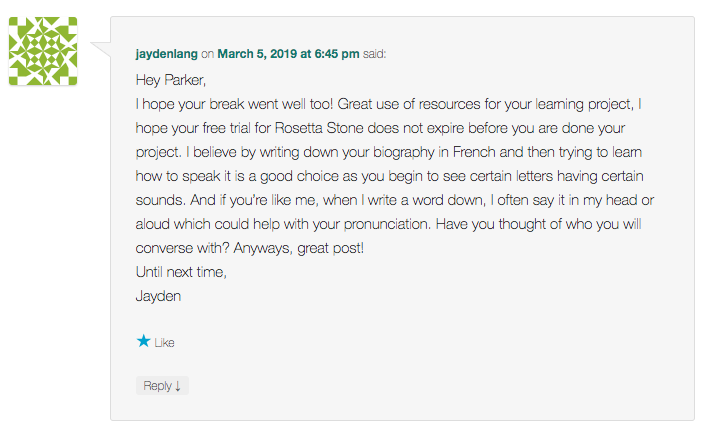
Megan. Megan is a science loving BEAD student with a BASC in Biological Science and Psychology. For her learning project, Megan decided to become a Dungeon Master. I thought this was a neat idea, partly because I had no idea what a Dungeon Master was so I learnt so much and partly because Megan embraced this project so much and got to spend time with her friends for this. Megan went from being concerned about her job done Dungeon Mastering to becoming a professional in my opinion. To succeed, she listened to podcasts (the ones which inspired her to be exact), had supporters (who even used the EDTC 400 hashtag), and even had a guest blogger offer his experience for being a first-time Dungeon Master. Like Parker, Megan also used resources and had great support. In EDTC 300, Megan learnt about coding, a new resource – Book Creator, the art of cyber-sleuthing just to name a few.
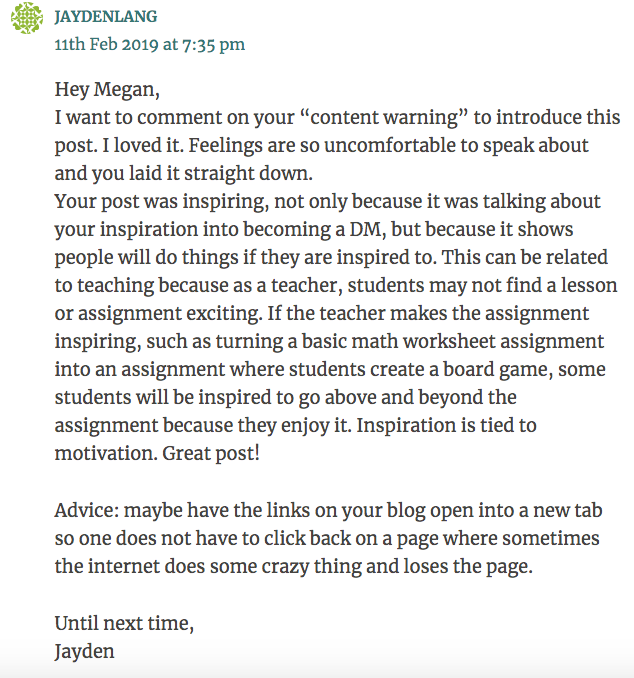
Hillary. Hillary is a fourth-year student in the secondary program with a major in English and a minor in French. For her learning project, Hillary made a beautiful blanket. To keep on top of her learning project, in each blog post, talked about her hardships experienced and always talked about what were the next steps needed to be taken which included what materials would be needed and what was going to be done. Hillary went from not using a sewing machine since grade 10 becoming a professional -creating a demin quilt. Hillary learnt similar topics to Parker and Megan. She learnt resources are great for teachers to use, coding isn’t her favourite thing to do but she has plans to use it in the classroom still as she sees the benefits of students learning to code and so much more – often referring what she learnt, to her classroom in the future.
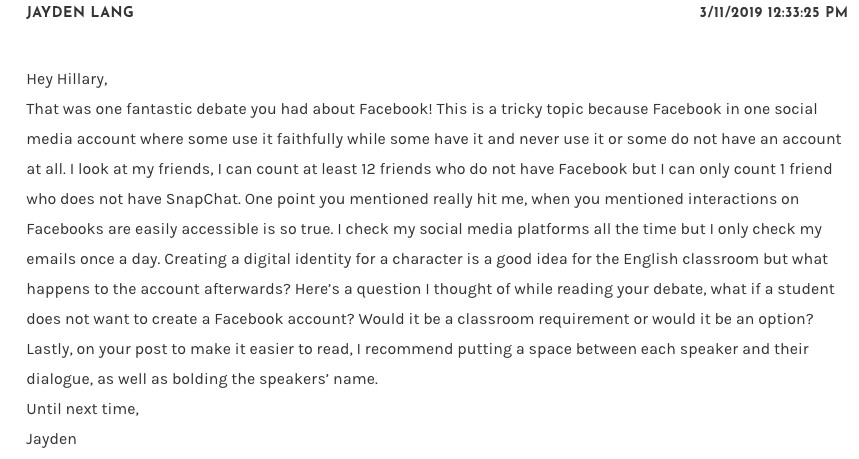
Were there elements that I found particularly challenging and/or rewarding?
At first, I was honestly scared of the mentoring assignment. I didn’t take EDTC 300 with Katia and had no idea what a learning project was. I think that was the most challenging thing. I didn’t know what to say to my mentees regarding their progress on their learning projects. Was I supposed to be nagging and always telling my mentees what to change or was I supposed to be supportive? I chose to be supportive. I chose this because I can’t be telling people what to do with THEIR learning project; it is their choice with how they want to do continue with their learning project. I also do not know what is happening in their lives so I couldn’t nag on my mentees about why they didn’t have a blog post in a certain week because life happens – simple as that. Another challenge I had was trying not to be too supportive because I know I would not like someone commenting on every single post “great job” so I tried to mention different aspects of the posts so my responses did not get too repetitive (sorry mentee’s if I did – I really tried to stop this).
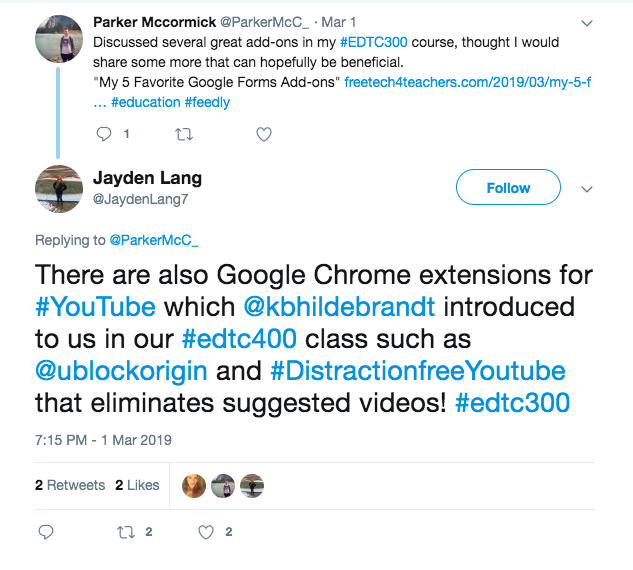
While I did experience challenges in my mentoring experience, I did experience rewards. Twitter is where I saw the most rewards. At first, I would retweet one of their Tweets about their blog posts telling my followers to check it out and I would mostly get a like, but as the semester went on, I positive differences. My mentees would soon be liking my Tweets, retweeting or commenting on a Tweet to spark a conversation about a certain topic. It was great to see my mentees start to converse, it helps them show their digital identity and they became more vocal on Twitter. I enjoyed seeing my mentees flourish with Twitter. Aside from Twitter, it was rewarding to see my mentees complete their goals with their learning projects. With not experiencing learning projects myself, I thought it was super cool to see students being able to teach themselves skills. It was rewarding to see how dedicated each student was towards their learning project – showing off their accomplishments in each post. In each post, the mentees started writing about their hardships and more of their thoughts which was great to see their progressions in blogging their experiences.
What did this process teach you about what it might be like to teach an online class?
The mentoring process taught me a couple of things about what it might be like to teach an online class. First, I learnt it takes more time to establish a relationship with students online because you only meet with students once a week. My EDTC 300 mentees were literally strangers to me and now I feel like we know a little bit about each other based on blog and Twitter Interactions. Talking online only without any face to face interaction creates a challenge in getting to know how to approach and talk to students. It takes more time to establish a basis to who the students are. Secondly, the mentoring experience has taught me how detailed guidelines have to be for classes such as detailed rubrics. I had no idea what to do in regard to how to mentor and with not much teacher interaction – I had to refer to the rubric. The rubric was very clear of expectations and answered literally all the questions I had on my mentoring portion of EDTC 400. Furthermore, I learnt how online classes allow one to learn from the coziness of their own house so it helps students learn since the classes are more flexible for life. Lastly, I learnt with assignments such as the EDTC 300’s weekly blog posts, it is harder to ask students why the assignment is not complete. As a teacher, I must trust the students with their progress on assignments as contact with the students is not as frequent. Also, from my experience from mentoring and prior online classes, I have learnt assignments without due dates such as Tweets or blog posts may not be done – assignments without due dates may be completed after assignments in other classes with priority. Plus, life gets in the way and sometimes blog posts may not be submitted in the recommended time.
What did I learn about teaching in general?
With teaching, I have learnt three things. First, I learnt the internet is powerful. How did I learn this? I learnt this because I have seen my mentees teach themselves French, sewing or being a Dungeon Master without sitting in a classroom. The resources my mentees used were mostly from the internet. The internet has allowed people to learn skills they may not have. Mentee’s if you are reading this… Would you have learnt your learning project without the help of the internet? With this, I learnt Slack is a great classroom tool for any class as it gives students the opportuniry to share resources, ask questions or direct message classmates for group projects. Even though I didn’t use this platform with my mentees, I learnt it is a great tool which hopefully I remember for when I become a teacher.
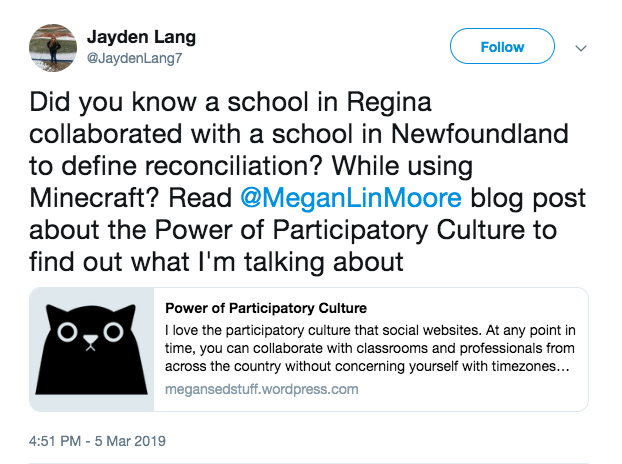
Secondly, I have learnt how to give positive advice and comments to students. I was scared of this because I have never done this, but I learnt that giving comments and advice to students helps them feel more confident in what they are doing. Teachers must be positive in what they are saying to students. There is a time and a place for criticism but teachers must not always criticise students as it eventually will affect their education and mental health.
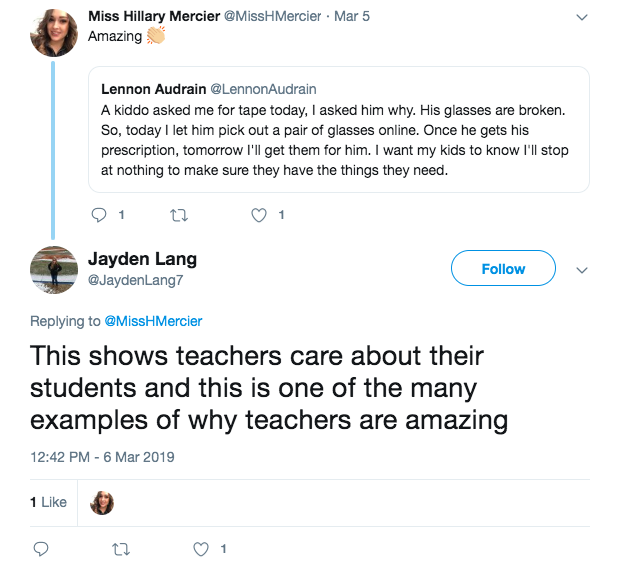
Thirdly, I have learnt how important ones’ digital identity is and how important it is to use platforms such as Twitter to communicate with other education professionals. By using Twitter, I learnt engaging in conversations with others on a topic helps one understand the topic at hand much better. Also, positive encouragement on the internet makes a person feel more confident in their work. By commenting on a blog post, you can see what other education professions are doing and thinking about literally anything. You can find new resources or gain new perspectives. Lastly, by commenting on a Tweet telling a fellow follower to feel better if they are feeling down or if they are struggling – it is good to let them know they are not alone.
Conclusion
If I was to redo my mentoring experience, I would. Something I would change would be introducing myself to my mentees with Slack – I never even thought of that, but I did introduce them on Twitter so that counts. I would continue with how I responded to blog posts – responding with different comments each time and communicating with my mentees once a week. I have learnt so much from my mentoring students with my biggest take-away being how important it is to encourage students and let them know they are doing good – it encourages learning. I would like to thank Katia for giving me the opportunity to learn how to be a mentor. Thank you to Parker, Megan and Hillary for being amazing mentee’s and doing a great job with their posts and doing fantastic with their learning projects. I hope to keep in contact will all of my mentees via Twitter mainly to see what they are sharing for resources and how their teaching careers are going.
Click here to view my mentoring chart!
Thanks for reading,
- Jayden
